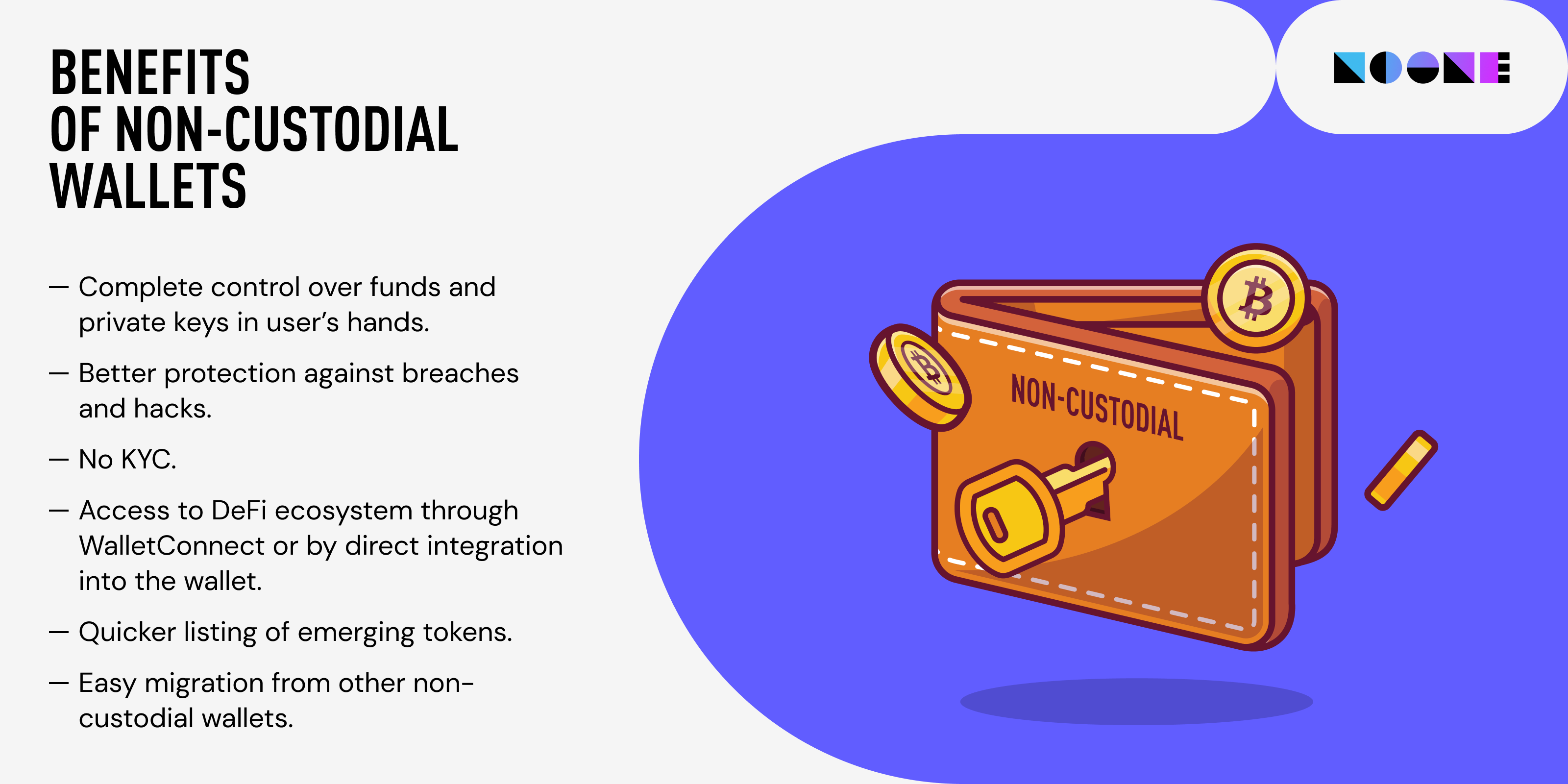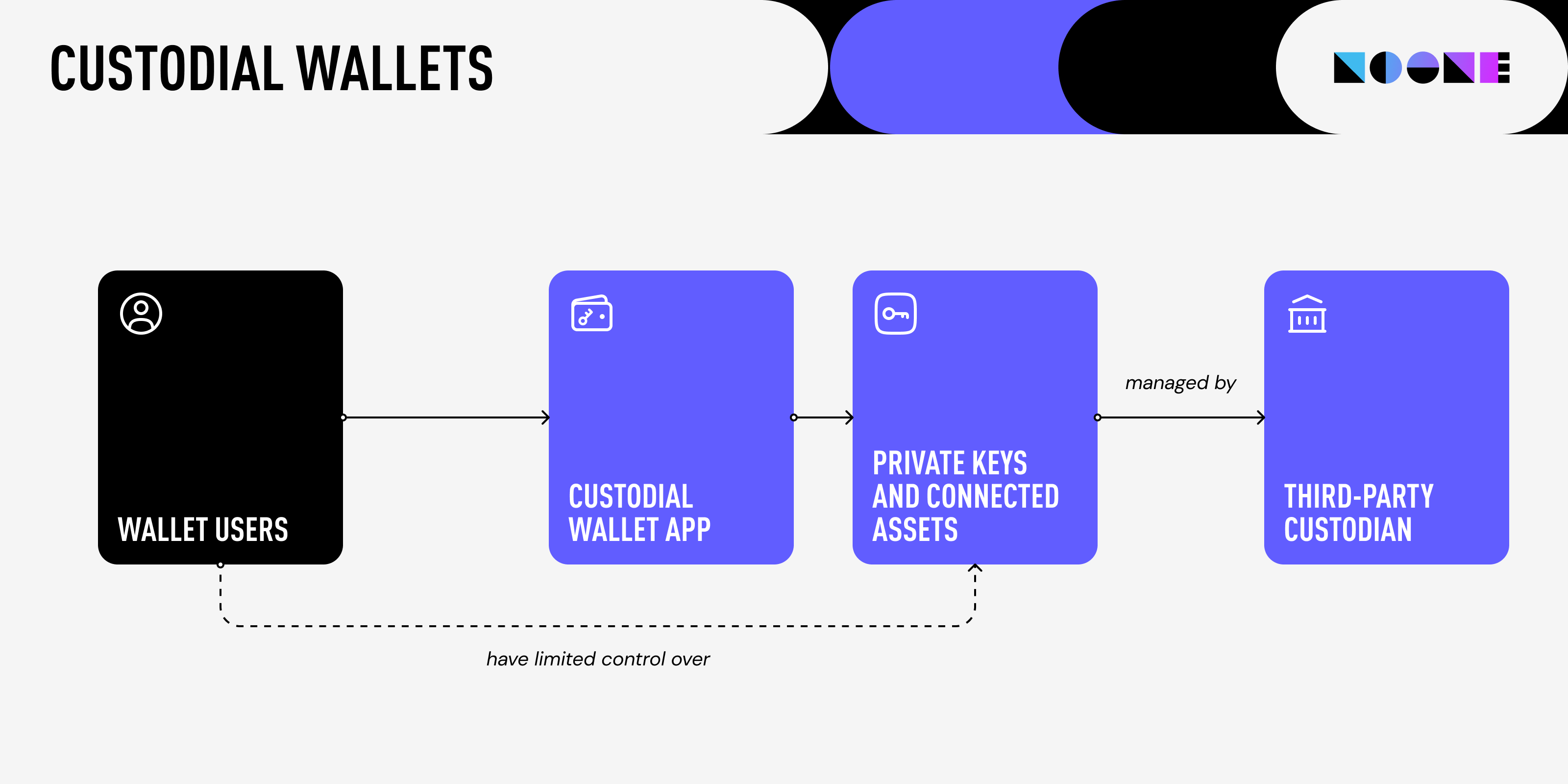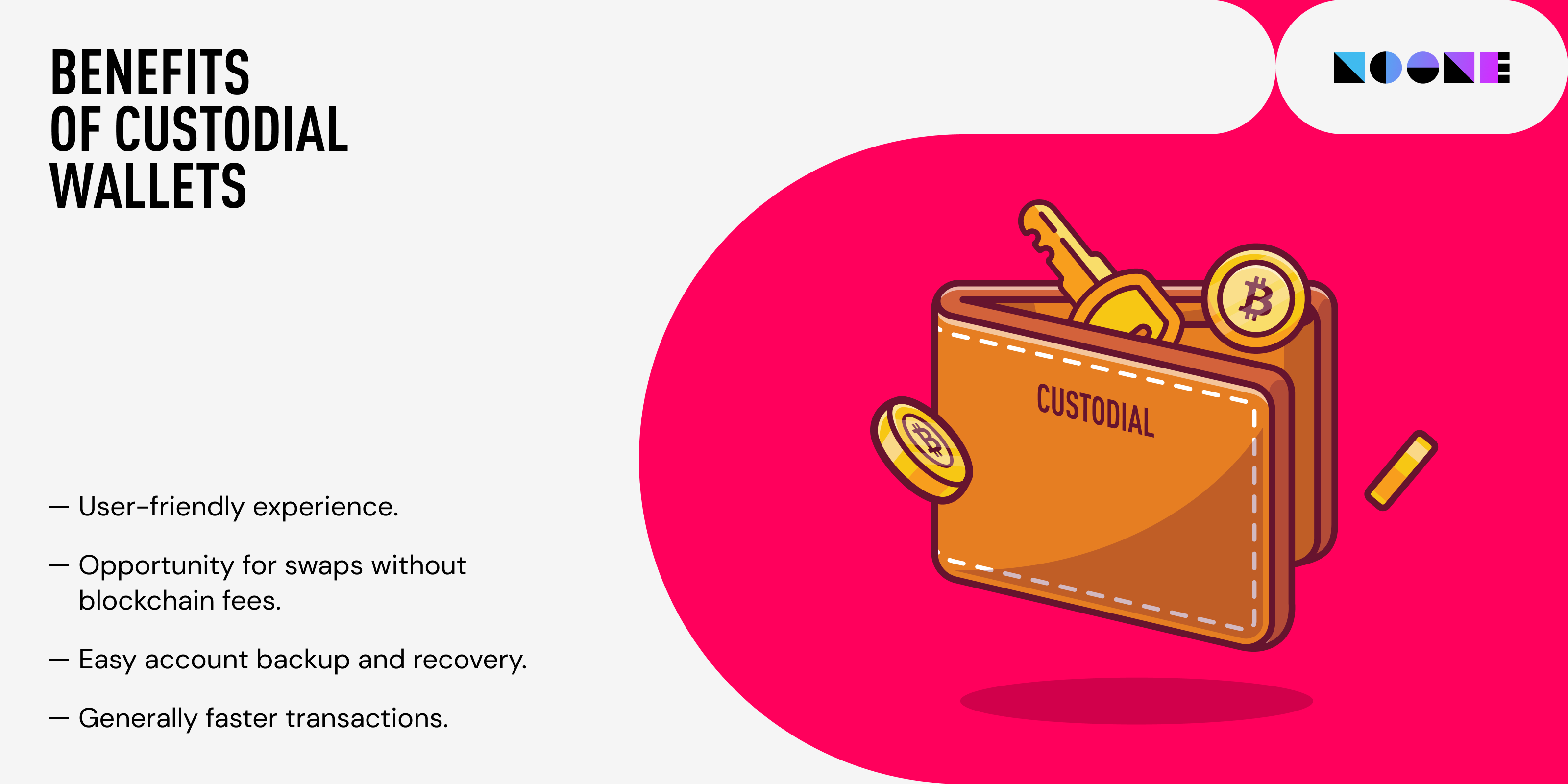For businesses venturing into cryptocurrency, the choice between custodial and non-custodial wallets isn't a straightforward decision. While the allure of complete control draws many towards non-custodial options, ruling out custodial wallets entirely might not always be the wisest choice. Each wallet type comes with its unique set of benefits and drawbacks, and the best fit for your business ultimately depends on your specific goals and your target audience.
So, before you jump on the "not your keys - not your crypto" bandwagon, let's explore both sides of the coin and determine which path aligns best with your business objectives.
In This Article
- Key takeaways
- Navigating Non-Custodial Wallets
- Custodial Wallets: Convenience and Considerations
- Deploying Your Crypto Wallet
- Making the Right Choice: Aligning Your Business with the Right Crypto Solution
Key Takeaways:
- Non-custodial wallets grant users full control and autonomy over their cryptocurrency by requiring them to take full responsibility for their security practices.
- The security benefit of non-custodial wallets comes from eliminating the risks associated with third-party control, not necessarily from being more secure against hacks.
- Only non-custodial wallets provide an essential gateway for businesses and users to directly engage with the DeFi ecosystem and smart contracts.
- Custodial wallets come with a more user-friendly experience ideal for beginners, with third parties managing the security and storage of digital assets.
- Custodial wallets deliver strong security measures comparable to non-custodial ones, but include the additional risk related to custodian exposure.
- Custodial wallets provide account recovery options through customer support, a critical service for users who may not be comfortable managing their own private keys.
Navigating Non-Custodial Wallets
Essentials of Self-Hosted Cryptocurrency Storage
Non-custodial wallets, also known as self-custodial wallets, put you in complete control of your digital assets. These wallets require users to manage their private keys, ensuring that they have full ownership and autonomy over their cryptocurrency holdings.
The primary advantage of a non-custodial option lies in its enhanced security due to user-exclusive access to funds. Unlike custodial wallets, where third parties have control over user assets, non-custodial wallets ensure that only the user can access and manage their funds. This exclusivity significantly reduces risks associated with third-party mismanagement or insolvency, but it's important to note that non-custodial wallets are not inherently more secure against hacks; rather, the security advantage comes from the elimination of risks that third parties might introduce.
Such wallets may require a bit more technical expertise to set up and use, making them better suited for experienced cryptocurrency users who already know their way around the basics.
Please note, if your goal involves developing a decentralized finance (DeFi) application, a non-custodial wallet is your only viable option. This is due to the necessity of direct interaction with smart contracts, a function only non-custodial wallets can provide. Keep this in mind as an essential factor.
Security and Complexity: Evaluating Non-Custodial Wallets
A non-custodial wallet attracts a clientele concerned with security and privacy. The benefits of this approach include strong user loyalty, a niche in the market catering to security-conscious individuals, and fostering a sense of empowerment among users. Such a wallet can expand by offering educational resources for users to enhance their technical knowledge and by partnering with decentralized applications and services that align with such a security-focused vision.

In addition to these core benefits, non-custodial wallets stand out by offering access to a diverse array of decentralized applications either through native integration into the wallet or via WalletConnect. This unique feature, typically unavailable in custodial wallets, opens up a world of opportunities for users, allowing them to directly interact with a myriad of blockchain-based services and platforms.
Moreover, a notable advantage of non-custodial wallets is the earlier access to emerging DeFi tokens. This is in contrast to custodial wallets, where a new token must first be approved and integrated by the custody platform. Explore the complete range of tokens currently accessible through Noone Wallet.
Another significant benefit of non-custodial wallets is the lack of KYC requirements which greatly simplifies the onboarding process. This absence of KYC processes streamlines the onboarding experience, making it both quicker and more user-friendly. It's a desirable feature for those who prioritize privacy, catering to users who prefer to keep their financial activities discreet and their personal information confidential.
Furthermore, non-custodial wallets simplify the process of migrating from other wallets. This ease of migration is not just a convenience but a critical factor in encouraging users to switch to a different wallet, ensuring they do not compromise on their past cryptocurrency activity.
Downsides of Non-Custodial Wallets
But while non-custodial wallets offer a range of appealing features, it is crucial to acknowledge the accompanying challenges and responsibilities that users must bear. These drawbacks include:
- Users are solely responsible for the security of their private keys. Loss or theft of private keys means irreversible loss of funds.
- Non-custodial wallets often require a higher level of technical expertise for proper management, which may require writing guides for inexperienced users.
- Since users are in control, errors such as sending funds to the wrong address can result in permanent loss, with no option for recovery.
- Properly backing up and safely storing recovery phrases requires careful planning, which can be daunting for some users.
Custodial Wallets: Convenience and Considerations
Custodial Features and Benefits for Your Business
Custodial wallets, on the other hand, are managed by third parties, such as cryptocurrency exchanges or financial institutions. They handle the storage and management of your digital assets on your behalf, offering a more user-friendly experience, which is particularly appealing to beginners. However, this convenience comes at a cost – security. By entrusting your assets to a custodial wallet, you release control over your private keys. In the event of a security breach or changes in the wallet provider's terms, users risk losing access to their funds.

The Trade-Offs of Custodial Crypto Wallets
A significant advantage of custodial wallets is their ability to offer instant exchanges without blockchain transaction fees for top currencies, making them a cost-effective choice for those who operate small amounts of different tokens. When you perform a token exchange within this environment, you're not executing a transaction on the blockchain itself. Instead, what happens is a record update within the custody provider's internal database.
Custodial wallets also offer a notable advantage in terms of easy account recovery. Managed by a custody provider, these wallets allow users to recover their accounts through customer support in case of lost access details. This feature is particularly valuable as it's not available in non-custodial wallets, where losing access keys often means permanently losing assets. This ease of recovery provides a significant safety net, particularly for those who value convenience in their digital assets management.

To continue growing, custodial wallets can focus on integrating user-friendly features, providing robust customer support, and forming partnerships with traditional financial services. These steps will offer a seamless bridge between conventional finance and digital currencies, appealing to a broader audience. The familiarity and support provided by custodial wallets are crucial in attracting and retaining users who might find the technical aspects of cryptocurrency management daunting.
Disadvantages of Custodial Wallets
While the advantages of custodial wallets make them an appealing choice for many, it is equally important to weigh these benefits against potential downsides:
- Users' funds are vulnerable to hacking and security breaches at the custodian level. Since all assets and user data are stored centrally, custodians become a lucrative target for cyber-attacks.
- Custodial wallets must adhere to governmental regulations, which can lead to frozen assets or account closure if the custodian faces legal issues.
- Custodial services often require personal identification information due to Know Your Customer (KYC) regulations, which could be a privacy concern for some users.
- Custodial wallets may not provide direct access to the full spectrum of decentralized finance (DeFi) services and platforms, limiting users' participation in this flourishing sector.
Deploying Your Crypto Wallet
When choosing Noone Wallet, the typical hurdles of deploying a cryptocurrency wallet are efficiently managed by our team. We take on the responsibilities of technical infrastructure setup, regulatory compliance, and user support, allowing you to deploy a wallet solution without the typical overheads and challenges.
Making the Right Choice: Aligning Your Business with the Right Crypto Solution
Choosing between custodial and non-custodial wallets is more than just a technical decision; it's about finding the right fit for your business goals and your customers' needs. Whether it's the ease of a custodial wallet or the control of a non-custodial one, this choice plays a key role in shaping your business's future and the security of your and your client’s digital assets.
If you're finding it tough to decide – don't worry, we're here to help you navigate this decision with friendly advice and expert insights. Feel free to get in touch with us [email protected]



